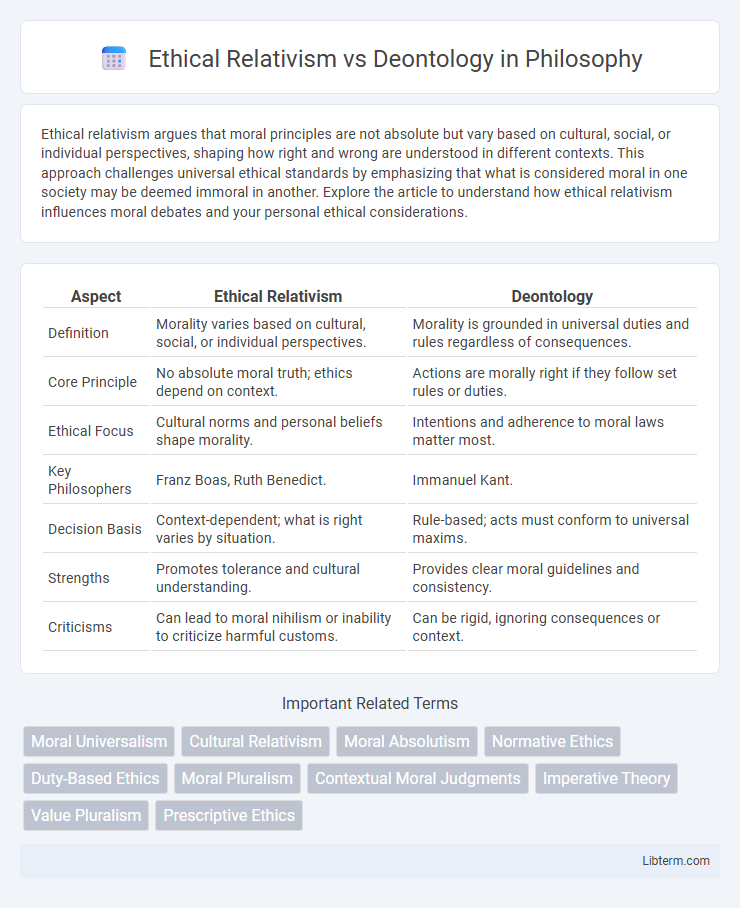Ethical relativism argues that moral principles are not absolute but vary based on cultural, social, or individual perspectives, shaping how right and wrong are understood in different contexts. This approach challenges universal ethical standards by emphasizing that what is considered moral in one society may be deemed immoral in another. Explore the article to understand how ethical relativism influences moral debates and your personal ethical considerations.
Table of Comparison
| Aspect | Ethical Relativism | Deontology |
|---|---|---|
| Definition | Morality varies based on cultural, social, or individual perspectives. | Morality is grounded in universal duties and rules regardless of consequences. |
| Core Principle | No absolute moral truth; ethics depend on context. | Actions are morally right if they follow set rules or duties. |
| Ethical Focus | Cultural norms and personal beliefs shape morality. | Intentions and adherence to moral laws matter most. |
| Key Philosophers | Franz Boas, Ruth Benedict. | Immanuel Kant. |
| Decision Basis | Context-dependent; what is right varies by situation. | Rule-based; acts must conform to universal maxims. |
| Strengths | Promotes tolerance and cultural understanding. | Provides clear moral guidelines and consistency. |
| Criticisms | Can lead to moral nihilism or inability to criticize harmful customs. | Can be rigid, ignoring consequences or context. |
Introduction to Ethical Relativism and Deontology
Ethical relativism asserts that moral principles are culturally based and subjective, varying according to societal norms and individual perspectives. Deontology, in contrast, emphasizes the intrinsic rightness or wrongness of actions based on adherence to universal moral duties and rules, independent of outcomes. These foundational ethical theories offer distinct frameworks for evaluating moral behavior, with relativism stressing context and deontology prioritizing objective principles.
Fundamental Principles of Ethical Relativism
Ethical relativism asserts that moral standards and principles are culturally based and therefore subject to individual societal norms rather than universal laws. It emphasizes the importance of context, suggesting that what is considered morally right in one culture may be wrong in another, rejecting absolute ethical rules. The fundamental principle of ethical relativism is that morality is not objective but relative to the values and beliefs of particular cultures or individuals.
Core Tenets of Deontological Ethics
Deontological ethics emphasizes the inherent morality of actions based on adherence to rules or duties rather than consequences. Core tenets include the principle that certain actions are morally obligatory, forbidden, or permissible regardless of their outcomes, grounded in universal moral laws. Immanuel Kant's categorical imperative underpins this framework, requiring individuals to act according to maxims that can be universally willed.
Moral Decision-Making: Context vs. Duty
Ethical relativism emphasizes moral decision-making based on the cultural and situational context, asserting that what is right or wrong varies depending on societal norms and individual circumstances. Deontology, in contrast, prioritizes adherence to universal moral duties and principles regardless of outcomes or context, framing morality as an obligation dictated by reason and rule-following. This contrast highlights the tension between flexible, context-driven ethics versus rigid, principle-based frameworks in evaluating moral actions.
Cultural Influences in Ethical Relativism
Ethical relativism argues that moral principles are shaped by cultural norms, meaning what is considered ethical varies across societies and historical contexts. This perspective emphasizes that customs, traditions, and social practices influence the definition of right and wrong, making ethics context-dependent rather than universal. In contrast, deontology maintains fixed moral duties and rules that apply universally, regardless of cultural differences.
Universal Moral Laws in Deontology
Deontology emphasizes Universal Moral Laws that apply consistently across all situations, asserting that actions are morally right or wrong based on adherence to these objective principles rather than consequences. Ethical Relativism challenges this view by arguing that moral judgments depend on cultural, societal, or individual contexts, rejecting universal standards. The contrast highlights deontology's commitment to absolute duties and ethical obligations that transcend personal or cultural variability.
Strengths and Weaknesses of Ethical Relativism
Ethical relativism offers the strength of promoting cultural sensitivity by recognizing diverse moral practices and avoiding ethnocentrism, which encourages tolerance and open-mindedness. However, its weaknesses include the potential for moral inconsistency and the inability to condemn harmful practices universally, as it lacks a fixed ethical framework. This can lead to challenges in resolving conflicts when different cultural values clash or when addressing human rights violations.
Pros and Cons of Deontological Ethics
Deontological ethics emphasizes adherence to moral duties and rules, offering clear guidelines for ethical behavior independent of consequences, which promotes consistency and respect for individual rights. However, its rigid nature can lead to conflicts between duties and a lack of flexibility in complex situations where outcomes matter. Critics argue this inflexibility sometimes results in morally questionable decisions when adhering strictly to rules ignores contextual nuances or potential harm.
Real-World Applications: Case Studies
Ethical relativism highlights cultural differences in moral norms, evident in international business practices where companies adapt to local customs to avoid ethical conflicts. Deontology enforces universal moral duties, shaping professional codes like medical ethics that prohibit actions such as patient confidentiality breaches regardless of cultural context. Case studies in global healthcare illustrate tensions between respecting local values and adhering to deontological principles, emphasizing the need for ethical frameworks balancing relativism and deontological imperatives.
Conclusion: Navigating Moral Complexity
Ethical relativism emphasizes understanding moral judgments within cultural and individual contexts, highlighting flexibility in ethical decision-making. Deontology stresses following universal moral rules and duties regardless of consequences, advocating for consistency and impartiality. Navigating moral complexity requires balancing respect for diverse perspectives with adherence to fundamental ethical principles.
Ethical Relativism Infographic

 libterm.com
libterm.com